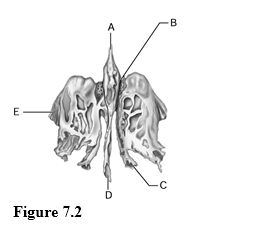________ are unique because they cannot grow, "eat," or reproduce by themselves.
A. Bacteria
B. Fungi
C. Protozoans
D. Viruses
Answer: D
You might also like to view...
__________ vesicles are transported to the membrane by the motor protein __________
A) Filled; kinesin B) Filled; dynein C) Empty; kinesin D) Empty; dynein Fill in the blanks with the correct answers.
Using Figure 7.2, match the following:

1) Nasal septum.
2) Turbinate bone.
3) Orbital area.
4) Olfactory bulb sits on this.
5) Nasal concha.
6) Rooster's comb.
What is the source of the salts that contribute to the high osmolarity of the medullary ECF?
a) the active transport of Na+, K+ and Cl- from the ascending limb of nephron loop b) the active transport of Na+, K+ and Cl- from the distal convoluted tubule c) the active transport of Na+, K+ and Cl- from the descending limb of nephron loop
The role of the accessory structures of the eye is to ________
A) focus light waves onto the retina B) prevent incoming light waves from being reflected out of the eye C) change the shape of the lens while focusing on objects that are distant or near D) protect the eye from airborne particles and dust